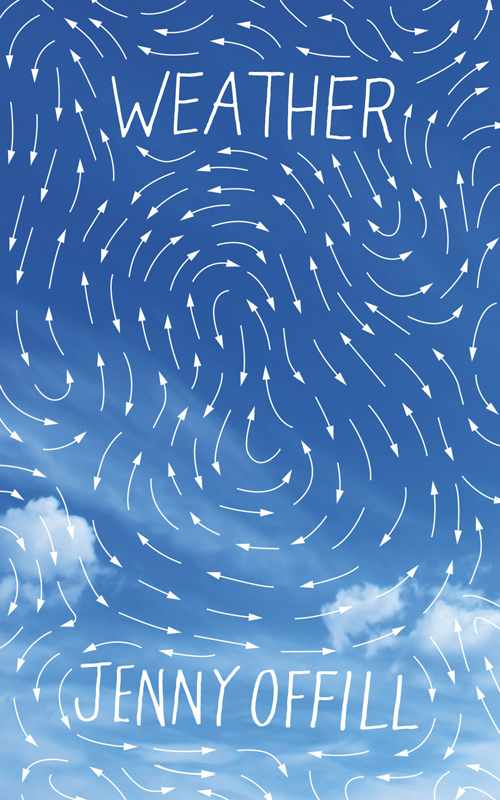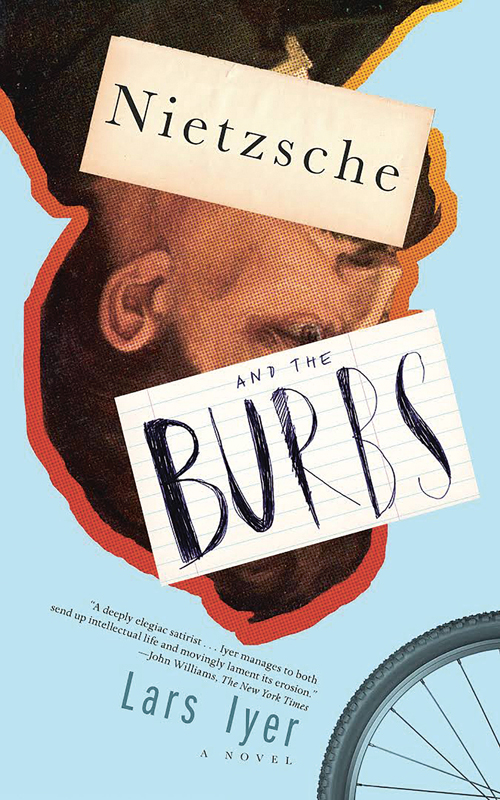Weather; it’s a clever name for a novel about one woman’s daily battle to stay sane and upright in the face of swirling storms, dark clouds, and killer lightning. Every aspect of Librarian Lizzie’s world, as portrayed in Jenny Offill’s latest novel, is under threat; her health, her food supply, her access to medicine, her marriage, her son’s future, her requirement to fill a hole in someone else’s life. And there are times when Weather reads almost oppressively, like the blackest of blackhole comedies. But like a great, wry Ali Smith novel, or that exquisite bookshop scene in Annie Hall (‘you only give me books with death in the title’) it’s that second part of the equation which keeps it gleefully alive; this paranoid wreck of a book is very funny.

It’s been six years since Offill’s Dept of Speculation basked in its rapturous celebrity-making reception, and a more fanciful reviewer might suggest that the allure of a shadowy retreat has influenced the setting of its follow up. Lizzie’s attention-eschewing day job in whispering academia suits her countenance as an observer; contemplative, fretful and kind, she is the unofficial shrink to her God-fearing mother and ex drug addict brother. When the broadcaster of the famous Hell and High Water podcast employs her to reply to listeners’ emails, it does little to soothe her own constantly nagging brain.
This is the poignant story of an ageing woman afraid of blurring out of meaningful existence.
The podcast’s dystopian vision of the Trumpian future has made it a lightning rod for catastrophists. Their email headings neatly summarise a zeitgeist obsessed with endings; inbuilt technological obsolescence, species extinction, pet heaven, The Rapture. Out in the real world young tech experts are waiting for the generation who remember the past to ‘age out of the conversation’ so that the transhuman future can properly begin. The value of old fashioned human beings – destructive, contradictory, self-fixated, vulnerable – appears to be diminishing. (Chris Packham will be pleased, I couldn’t help thinking.)
Worse case scenarios plague Lizzie’s daily life. Her son Eli is a worrier who screams at the sight of a knob of ginger, imagining it’s a mouse skull. A request for reassurance from her husband Ben about a click in her knee returns a playfully teasing diagnosis of knee cancer. She is addicted to advice about survival in the face of the apocalypse. But, rather like the protagonist of Anne Tyler’s Ladder of Years, what’s really bothering her is ‘acceleration of days.’ Ultimately this is the poignant story of an ageing woman – a besotted mother, a greying wife, a low-achieving worker – afraid of blurring out of meaningful existence. Told in Offill’s trademark style – a series of mental post-its, seemingly plucked from the air the way Keith Richards grasps at passing guitar riffs – it hits so many chords it makes a music of its own.

Staying on the theme of despairing nihilism (‘come on in, there’s coffee and doughnuts for everyone’), Lars Iyer follows up his sublime Wittgenstein Jr with another high school-set novel, Nietzsche and the Burbs. Philosophy academic Iyer has created his own little sub-genre – a combination of enlightening philosophical discourse, adolescent chatter, and smartass (in a good way) humour. Nietzsche and the Burbs is the metal band fronted by the new sixth form boy, nicknamed after Friedrich due to his bleak outlook and extreme cleverness. The kids hang out and talk about life, the future, why everything is fucked, and how they can change the world. Think The History Boys with (loads of) added philosophy. Completely delightful.
Weatherby Jenny Offill is out now (Granta, £12.99)









